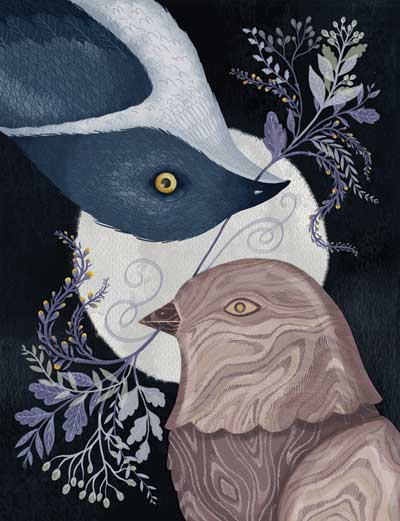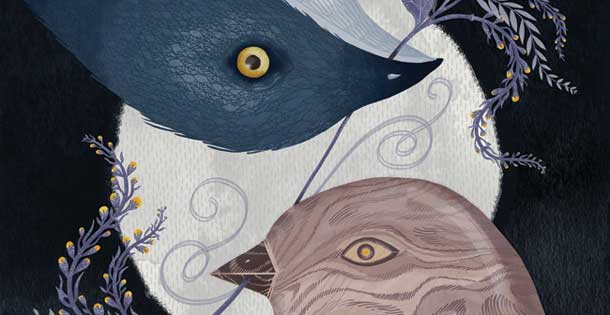
The first time he was caught, it was by his mother. Anne heard the sounds of bare footfall on the kitchen tiles late that evening and dressed herself in the hallway outside her bedroom, careful not to wake her husband. In the kitchen she found the screen door cracked open, a pair of jeans clumped in the yawn of the door. Stuffed down inside the jeans was a pair of her son’s underpants. Outside, on the first two steps, lay a pair of dirty socks, and on the last a wadded T-shirt.
She turned off the light in the kitchen and then went into the living room. She looked out behind the house into the dim grove, and there was nothing. The deep rows of pecans fell away and converged farther than her eyes could follow. At the front of the house she put her face to the window, cupping her hands against the cold glass, and for a moment saw nothing. And then, out by the road, outlined in the scant moonlight, was her son, standing there without a stitch of clothing on.
Anne watched as if spellbound, feeling a strange warmth move across her skin as the boy ran between the trees, reaching out his hand to touch the trunks, circling one after another. She watched him until his motion, from tree to tree, took him out of her sight; it looked like some unworldly ritual, and it stirred her heart. She felt the urge to remove her own clothing and join him, to hold him against herself for a long time. Who are you? she thought. Can you tell me who you are?
THAT NIGHT SHE folded her son’s clothing neatly and left it for him on the top step of the kitchen stairs, as if to say, This won’t sit well with your father.
A week later she woke in the middle of the night to find her husband standing by the bedroom window. His chest and arms blanched in the weak light that fell between the stiles.
“James?” she asked.
“Thought I heard something,” he said.
She had hoped that the boy would go through this phase, this behavior, undetected. Or maybe she hoped her warning–an offering of folded clothes–would put an end to this before her husband found out.
“You were dreaming,” she said, patting the sheets beside her.
“I wasn’t,” he said. “Now hush.”
A long moment passed, and Anne filled it with the image she knew would soon appear, of Silas running barefoot in the season before the shake, when there was no husk of crop on the ground. James tilted his head to one side and moved his face even closer to the window. “What in God’s name?” he said. He went to the foot chest and stepped into his pants and pulled on his shirt and was out the door before it was buttoned.
The boy was retrieved back into the house and examined in the kitchen before being given a chance to put his clothing back on. James wanted to quote a scripture to his son–a custom in their house before punishment of any kind–something about nudity or nighttime or both, but he could think of nothing that applied. Instead he looked hard at Silas and said, “Do you see any deer, cattle, or hogs living in this house with us?”
“No, sir,” Silas said, following the logic with care.
“Do you want to go out to live with them?”
“No, sir,” he said again.
“You’ll keep your clothes on in and out of this house unless you’re bathing. You understand?”
Silas’ eyes crept up the arch of a long switch resting loosely in his father’s right hand. There were slips of ripe green along its shaft where his father had shaved off the new branches. For a reason he could not name, maybe nervousness or because he had no explanation, Silas began to smile. He felt the smile creep into the muscles of his face, a tightness, as if his face had been plunged into cold water, and he knew he couldn’t keep the smile from arriving and that it was a horrible thing and that fact only made the smile determine itself. He was stark naked, standing in the dim kitchen, and now, to his horror, he was grinning at his father.
“This won’t be funny,” his father said. He put his large hand on the narrow shoulder and turned Silas against the refrigerator and brought the switch down on the fair thighs and legs, invoking dark purple welts on the skin.
SILAS WAS MORE careful the next time. He performed his rite farther from the house, deeper in the avenues of the grove. He was caught a second time but only because James had gotten into the habit of wakening up in the middle of the night and walking down the hall to the boy’s room. That night, after finding his son’s bed empty, James went out into the grove like a fury, calling the boy’s name. It seemed for a while that Silas would remain in the cold, waiting out his father.
James continued to call–assuring the boy that he would wait for him all night and all morning, for as long as Silas liked–and after several more minutes Silas appeared, again completely nude, summoned from the trees like a ghost. It was late November, and the breath from the two bodies, one clothed and one bare, one breathing heavily from exertion and the other from pain, poured out in thick clouds that hung around them and slowly dissipated. The switch went to work again on the boy’s legs and back. This time it moved faster than before, fast enough to open the skin where it was most tender, behind the knees, across the lower back. It was the last time Silas went running in the grove undressed, and they never mentioned it again as a family.
James understood that night that his son was something he would never completely comprehend. There were, of course, some things in the boy that reminded James of himself, his willfulness especially. But there was another side, he realized, a hemisphere waxed always away from him, an unlit landscape he couldn’t map or reckon with.
Become a Saturday Evening Post member and enjoy unlimited access. Subscribe now




Comments
I started reading this story while waiting at the Dr.’s office and had to finish it on-line. It was like a good book. I had to know what happened. I thought is was a great ephiphany when James knew that Silas had carved the birds and that now he knew his son. I wanted James to find all of the birds buried under the porch. A really great short story. Want to know about Silas’s future.
I thought this was really good. The characters in this story are more developed and intriguing than the length of the story might suggest, and I was left wanting to know what became of Silas and his family.
I enjoyed the story. The son’s behavior is not what the father wanted or expected of his son. The mother tried to protect the son because she understood her husband’s expectations. When the father discovers the wooden birds, he knows his son carved them. I was surprised by the father’s reaction. I thought he was going to pull the shed down and destroy the son’s workplace. However, the father cleaned it up and made a nice work area for his son. The actions by the father demonstrated his acceptance of his son and his talents.
I didn’t think I was stupid, but I didn’t get the jest of the story Silas
Please help. Thank you.